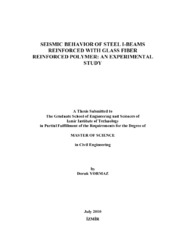Please use this identifier to cite or link to this item:
https://hdl.handle.net/11147/3050Full metadata record
| DC Field | Value | Language |
|---|---|---|
| dc.contributor.advisor | Eğilmez, Oğuz Özgür | en |
| dc.contributor.author | Yormaz, Doruk | - |
| dc.date.accessioned | 2014-07-22T13:50:47Z | - |
| dc.date.available | 2014-07-22T13:50:47Z | - |
| dc.date.issued | 2010 | en |
| dc.identifier.uri | http://hdl.handle.net/11147/3050 | - |
| dc.description | Thesis (Master)--Izmir Institute of Technology, Civil Engineering, Izmir, 2010 | en |
| dc.description | Includes bibliographical references (leaves: 107-111) | en |
| dc.description | Text in English; Abstract: Turkish and Enlish | en |
| dc.description | ix,55 leaves | en |
| dc.description.abstract | Design guidelines, which are put into effect in the aftermath of the 1994 Northridge earthquake, require intermediate and special moment frames (IMF and SMF) be capable of maintaining 0.02 and 0.04 radians interstory drift, respectively without significant strength degradation and development of instability. However, local buckles in the plastic hinge region are major hindrances for the ductility capability and stability of the structural system. Thus, the research program aims to mitigate such inelastic instabilities by using glass fiber reinforced polymer (GFRP), which possesses elastic modulus roughly one order of magnitude less than that of steel. On the other hand, this elastic modulus discrepancy between GFRP and steel can be useful for stabilizing local buckles by means of the bracing effect of GFRP during plastic hinge formations. This thesis describes large-scale experimental study of the research program that investigates the seismic behavior of steel I-beams reinforced with GFRP. In this experimental study, four HE400AA beams with welded haunch (WH) modification and three HE500AA beams with no modification were tested under cyclic loading. The results of experimental study indicate that it does not seem possible to rely on GFRP reinforcement to increase the flexural resistance of connections at a rotation of 0.04 radians because the adhesive layer between steel and GFRP fails in rotations much lower than 0.04 radians. However, the seismic performance of the structure can be moderately improved with the bottom flange WH and GFRP reinforcement in order to maintain rotations without local buckles in accordance with the rotation demand of IMFs, which is 0.02 radians. | en |
| dc.language.iso | en | en_US |
| dc.publisher | Izmir Institute of Technology | en |
| dc.rights | info:eu-repo/semantics/openAccess | en_US |
| dc.subject.lcsh | Earthquake resistant design | en |
| dc.subject.lcsh | Stel I-beams | en |
| dc.subject.lcsh | Glass-reinforced plastics | en |
| dc.subject.lcsh | Fiber-reinforced plastics | en |
| dc.title | Seismic behavior of steel I-beams reinfor ced with glass fiber reinforced polymer: An experimental study | en_US |
| dc.type | Master Thesis | en_US |
| dc.institutionauthor | Yormaz, Doruk | - |
| dc.department | Thesis (Master)--İzmir Institute of Technology, Civil Engineering | en_US |
| dc.relation.publicationcategory | Tez | en_US |
| item.fulltext | With Fulltext | - |
| item.grantfulltext | open | - |
| item.languageiso639-1 | en | - |
| item.openairecristype | http://purl.org/coar/resource_type/c_18cf | - |
| item.cerifentitytype | Publications | - |
| item.openairetype | Master Thesis | - |
| Appears in Collections: | Master Degree / Yüksek Lisans Tezleri | |
Files in This Item:
| File | Description | Size | Format | |
|---|---|---|---|---|
| T000180.pdf | MasterThesis | 14.46 MB | Adobe PDF |  View/Open |
CORE Recommender
Page view(s)
200
checked on Nov 18, 2024
Download(s)
96
checked on Nov 18, 2024
Google ScholarTM
Check
Items in GCRIS Repository are protected by copyright, with all rights reserved, unless otherwise indicated.